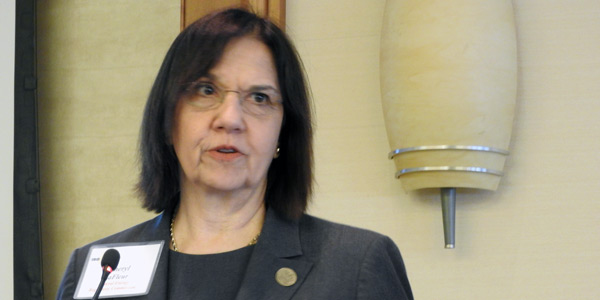By William Opalka
BOSTON — The New England Power Pool’s collaborative process to address climate change while preserving wholesale electricity markets won an endorsement from FERC Commissioner Cheryl LaFleur at the ISO-NE Consumer Liaison Group meeting Thursday.

LaFleur | © RTO Insider
LaFleur, a New England native, was referring to the Integrating Markets and Public Policy collaborative, which seeks to reconcile markets with state mandates to decarbonize the grid. (See Markets vs. Climate Goals the Subject at NECA Conference.)
Stakeholders are meeting into next year with the goal of having ISO-NE present Tariff revisions to FERC.
“I think there’s a lot in it for customers because we will still harness the power of the competitive market while also having the states address climate change [to see if] those are two things that can be reconciled,” she said.
One contentious point is that states have mandated clean energy procurements leading to subsidized out-of-market contracts that skew prices.
“What I’m worried about as we go forward is if we go without a plan and try to have it both ways: try to have a market that’s working … but then we get to a place where it’s not working and it begins to be cannibalized by the subsidized resources,” LaFleur said.
Noting the unlikelihood that the Trump administration would endorse a federal carbon tax, LaFleur said that the commission would probably look favorably on a state-based consensus that meets the regional goals along with market-based solutions.
“In my mind, Plan A is the region creates some kind of comprehensive plan that recognizes the state environmental goals and the [role of] pricing in the wholesale market and files it at FERC,” she said.
She said the two alternatives would have unappealing outcomes: The current state of affairs, with FERC acting as arbiter in the disputes between state governments, RTOs and market participants; or a de facto reregulation, as states more actively promote resource adequacy with preferences for cleaner energy sources, with out-of-favor generators then looking for their own state support.
“Pretty soon you realize the market’s pretty small and you’ve reregulated in a messy, expensive way. I don’t think that’s a good idea, particularly for a region that invented competitive markets, ISO-NE,” she added.
Adjustments Ahead
Besides an expected lessening of government activism in climate policy, LaFleur will have to adjust to being a minority member of FERC when three Republicans are expected to be nominated to FERC next year.
“[FERC commissioner] is my first government job and it’s only been for President Obama, so I’ll see what it’s like,” she said. LaFleur said the Democrats on the commission had a good working relationship with the former Republican members. “The only thing we’ve had that had a partisan feel was anything that relates to environmental rules.”
That could continue.
“One of the things everyone will be watching is where the new administration takes us in the intersection of energy and the environment,” she said.
Regardless of what the Trump administration does, LaFleur said, she’s on FERC for the duration.
“I plan to serve out my term until 2019. I don’t know what anybody else is going to do, but I know what I’m going to do,” she said.



